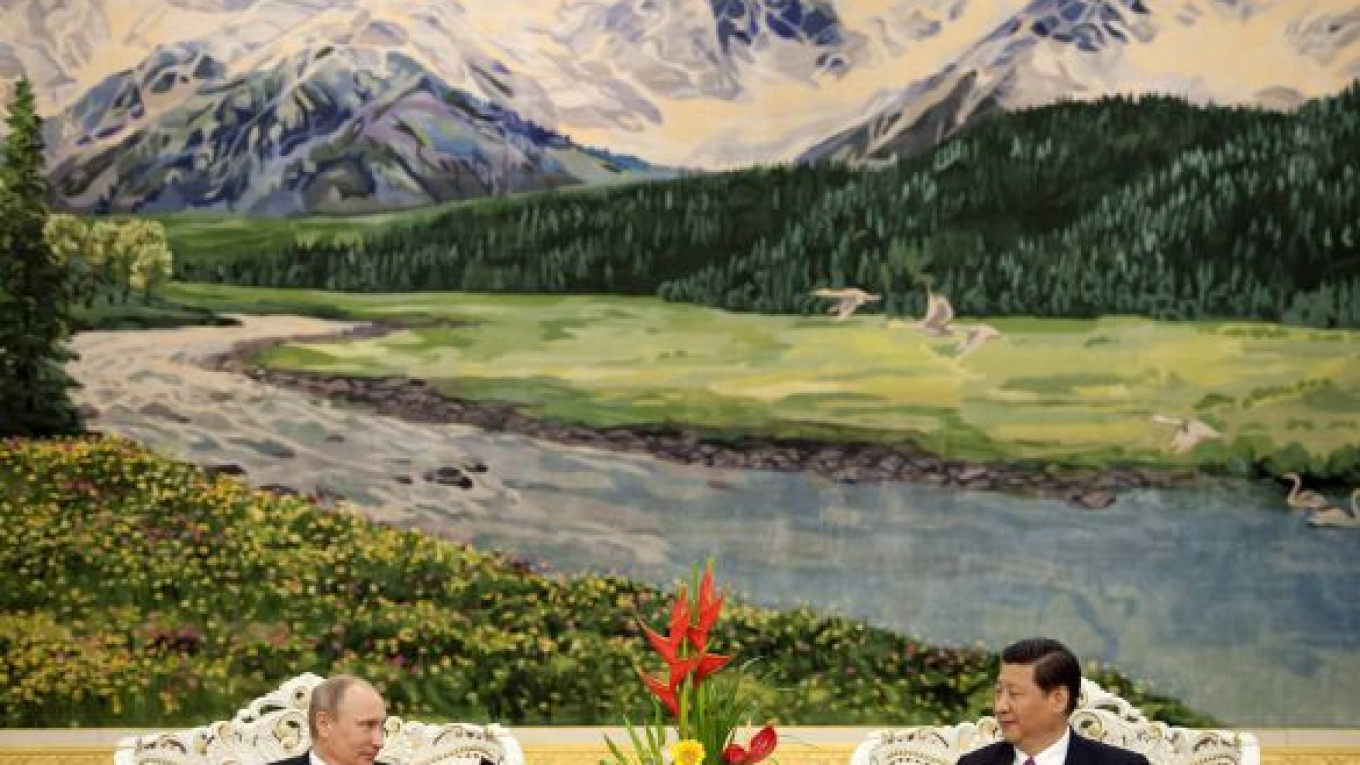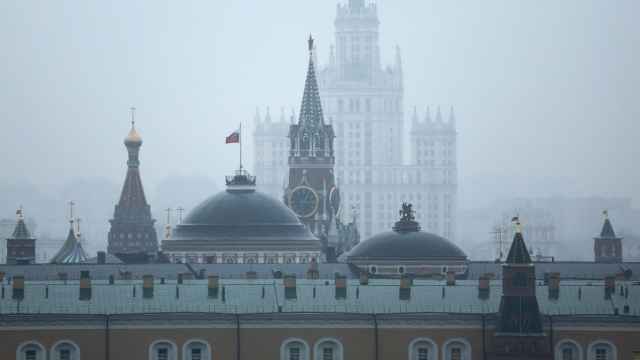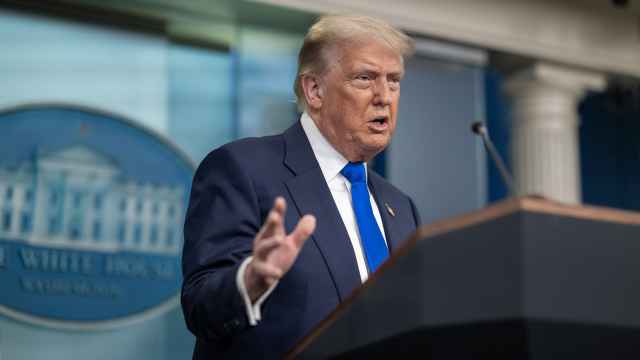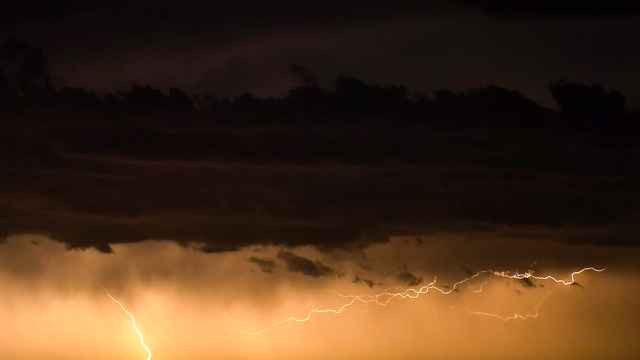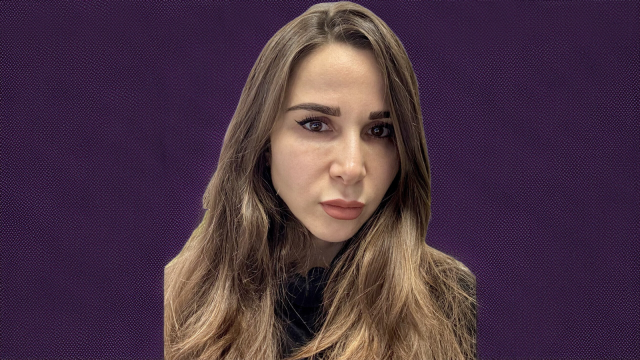Russia will attempt to play mediator between Iran and the West when President Vladimir Putin sits down with his Iranian counterpart Mahmoud Ahmadinejad in Beijing on Thursday, a top Putin aide said.
The timing of the encounter between the two leaders has not been officially confirmed but is widely expected, and comes as the United Nations Security Council gears up for another round of talks with Tehran later this month aimed at stopping Iran's nuclear-enrichment program.
"The meeting with Mahmoud Ahmadinejad will allow Vladimir Putin to feel the heat of the situation surrounding Iran's problem and how the situation is interpreted in Tehran," said Putin aide Yury Ushakov, according to RIA-Novosti.
The Russian-Iranian bilateral meeting comes on the sidelines of the Shanghai Cooperation Organization summit, a two-day gathering of regional powers sandwiched in the middle of Putin's Asia tour.
For Russia the meeting paves the way for high-stakes talks between Iran and the P5+1 group — the five permanent members of the United Nations security council plus Germany — scheduled for mid-June in Moscow. The P5+1 wants to stop nuclear enrichment in Iran, while Tehran is trying to ease UN sanctions.
Since the last round of P5+1 talks in Baghdad in May, inspectors from the International Atomic Energy Agency have found traces of enriched uranium at higher levels than previously at the Fordou nuclear site in Iran.
"Russia will use the meeting to make Iran more flexible and more open to cooperation with the IAEA," said Peter Topychkanov, an associate at the Moscow Carnegie Center.
He added that "relations between Iran and Russia are not so good because of Moscow's support for the UN resolutions," a reference to the past declarations that Russia has signed against Iran's nuclear program.
"That is why Putin will use this meeting to clear up the concerns they will have," Topychkanov said.
Russia has been warning Western powers against bombing Iran for months. The consequences of a military strike would be "entirely negative" for many neighboring countries, the secretary of the Russian Security Council, Nikolai Patrushev, told state-owned Rossia 24 on Wednesday.
Russia, which built Iran's Bushehr nuclear power plant, supports the Islamic republic's right to a civilian nuclear program, but says that it opposes a nuclear-weapons program.
The meeting with Ahmadinejad will cap a summit on security with leaders from China and four Central Asian countries.
Leaders from the Shanghai group declared their interest in stabilizing Afghanistan when NATO forces leave at the end of 2014, although few details emerged when the first day of the meeting ended Wednesday. A strategy for combating terrorism, separatism and extremism in 2013-15 would be agreed upon by the group, Putin said in an article published in a Chinese newspaper.
Afghanistan, whose President Hamid Karzai attended the meeting, was also likely to get observer status at the Shanghai group in a symbolic gesture.
"The withdrawal of coalition forces from Afghanistan carries serious risks for security and stability in the region," Foreign Minister Sergei Lavrov said.
"It is not clear what the situation will be in Afghanistan after 2014," Topychkanov said. "There is a limited dialogue between NATO, the U.S. and Russia regarding concrete plans beyond 2014."
He was skeptical about whether major plans would emerge from the current Shanghai group meeting on Afghanistan.
"It's hard to expect progress," he said, "all these countries have their own positions."
A Message from The Moscow Times:
Dear readers,
We are facing unprecedented challenges. Russia's Prosecutor General's Office has designated The Moscow Times as an "undesirable" organization, criminalizing our work and putting our staff at risk of prosecution. This follows our earlier unjust labeling as a "foreign agent."
These actions are direct attempts to silence independent journalism in Russia. The authorities claim our work "discredits the decisions of the Russian leadership." We see things differently: we strive to provide accurate, unbiased reporting on Russia.
We, the journalists of The Moscow Times, refuse to be silenced. But to continue our work, we need your help.
Your support, no matter how small, makes a world of difference. If you can, please support us monthly starting from just $2. It's quick to set up, and every contribution makes a significant impact.
By supporting The Moscow Times, you're defending open, independent journalism in the face of repression. Thank you for standing with us.
Remind me later.


